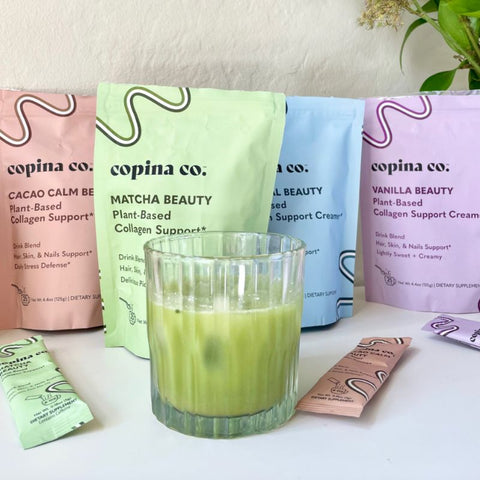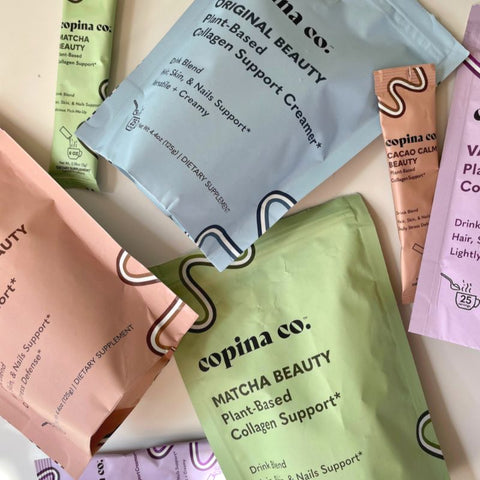Whether you are dipping your toe into a plant-based life or you are a vegan, finding the best plant-based milk for your lattes or smoothie can be difficult - there are so many options out there! Got whiplash just from looking at the plant-based milk section in the store? No worries. We’ve put together a list of our team’s favorite plant milks just for you.
As a vegan collagen brand, we knew a lot of our recipes and beauty blends go hand-in-hand with plant-based milks. In honor of our favorite partner-in-crime, here is a list of some of our well-liked and loved plant-based milks.
Elmhurst Nut Milk
A fun fact about Elmhurst is that its founder is actually Henry Schwartz, a man in the dairy business for a while. His family had been running Elmhurst Dairy since 1925. In 2017 he went to work with Dr. Cheryl Mitchell to perfect HydroRelease minimal food processing in order to work on his new line of plant-based milk
His milks come in a variety of types and sweetened and unsweetened versions. They all are made with HydroRelease processing. This makes them free from emulsifiers, preservatives, and other additives. It is very creamy and nutty.
Flavor Options: Almond milk, cashew milk, oat milk, walnut milk, hazelnut milk, unsweetened, sweetened, and chocolate
MALK
In 2014, mother August Vega went to work trying to make plant-based milk using whole food organic ingredients due to her son having been diagnosed with the same dairy allergy she had.
Currently, MALK has almond and oat milk containing only three ingredients: almonds or oats, water, and pink sea salt. Their vanilla flavors include the addition of organic vanilla flavor from vanilla beans.
The taste is a little thinner, make sure to shake the bottle before use.
Flavor Options: Almond, oat, unsweetened original, vanilla
Milkadamia Macadamia Nut Milk
The brand was founded by an Australian macadamia nut farmer who saw the potential in making non-dairy milk from macadamia nuts. The company still uses its own organic nuts and ones from partner farmers. The milks do have some added ingredients like added minerals, lecithin, and gellan gum.
It tastes like the flavor of macadamia nuts while being sweet with hints of vanilla and fruit. It is incredibly creamy.
Flavor Options: Macadamia-based unsweetened variety, lightly sweetened, vanilla, and latte blend
Ripple Pea
Ripple Milk is a great nutrient-dense and protein-packed milk. It mimics cow milk’s texture while having less sugar. In fact, it has more protein than almond milk with its ingredient list having: water, pea protein, cane sugar, sunflower oil, and some vitamins, minerals, and natural thickening agents. If the ingredients list isn’t what runs your decision-making, this milk is great for added protein.
It is creamy, very similar to dairy milk.
Flavor Options: Original, unsweetened, vanilla, vanilla unsweetened, and chocolate
Pacific Foods
Pacific Foods’ plant milks are a great way to dip your toes into dairy-free milks without breaking the budget. They have a wide array of types of milks ranging from hemp to almond. In October of 1987, they opened in Tualatin, Oregon, and began making tofu and soy milk. Aseptic packaging allowed them to create other non-dairy beverages that didn’t require refrigeration, which is why you can find them on the shelves of grocery stores.
The taste of the milk depends on the type you buy from them. Our staff favorite? They’re hemp milks!
Flavor Options: oat, soy, hemp, hazelnut, coconut, cashew, sweetened, and unsweetened
Califia Farms
Califia farms have a wide range of plant-based milks and creamers. In case you are stumped, it is pronounced Cal-uh-FEE-ahh named after the legend of Queen Califia. Like Pacific Foods, they also carry a few shelf-stable options but are mainly focused on making plant-based milk with low-to-no sugar added.
They make a variety of milk types ranging from oat, almond, and coconut. Some are even made into blends with multiple nut/plant options.
Flavor Options: oat, almond, toasted coconut and almond, vanilla, protein oat, coconut, and chocolate
Which Milk is the best of the best?
Although everyone’s opinions are different when it comes to, well everything, we know we can’t answer what milk is the “best” because everyone's goals and tastebuds regarding food vary. Some people really value ingredients over taste while others find shelf-stable options more important. To answer this question most honestly, we left a few of our recommendations down below!
Team Copina Co.’s Picks
- Minor Figure's Barista Oat
- Tache Pistachio Milk
- Homemade Almond Milk with Dates
- Good Karma Flax Milk Unsweetened
- Califia Farms Extra Creamy Oat
- Honorable Mention: Chobani Extra Creamy
How to Add Copina Co.
When it comes to plant-based milk, there is no better pair than our vegan collagen boosters. If you want to add your beauty blends to your plant-based milk let’s break down how you might be able to do so. Our blends come with organic rice milk and coconut milk already mixed in.
With our Original and Vanilla collagen boosters, you can simply add one scoop of either to half a cup of plant milk to either make a Collagen Creamer or to simply make the milk you are adding to your smoothies and coffees have some added benefits. To make the milk more latte-like try using a hand-held frother. If you simply wanted the added benefits, add one scoop to your milk of choice and stir or shake your ½ cup-8 oz.
What Milk Brand is the “healthiest”?
Again, everyone’s version of healthy varies. When it comes to the most simple ingredients the answer is most likely MALK or milk you are making at home. Those who value protein might be leaning towards Ripple due to its low sugar and high protein content.
What Types of Plant-Based Milk Are Better for the Environment?
A large part of why people might lean towards buying plant-based milk over dairy milk besides dietary choices like being vegan or vegetarian have a lot to do with dairy milk’s environmental effects.
That being said, some plant-based milks are better than others. Instead of going on a brand-by-brand basis, let’s break it down by nut type.
- Almonds have a very low carbon footprint, but it requires a lot of water to produce.
- Rice milk also requires a lot of water to produce.
- Coconut milk doesn’t need a lot of water but the popularity of the milk and oil has affected rainforest destruction.
- Cashew and macadamia nuts require less water and have a relatively low carbon footprint.
- Hemp and flax milk are a little nicher and harder to find but also are good choices for the environment.
- Lastly, peas require less water than almonds to grow and oats are environmentally friendly when grown in crop rotation.
Finding the right milk for you might take longer than expected. Using trial and error can be helpful while taking a look at the milk bases and ingredients to find what fits best with your diet and preferences.
If you are looking for some recipes to make with your plant-based milks, look no further! Here are a few of our favorite milk-based recipes:













